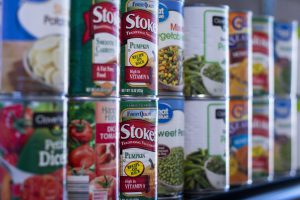
Stock up on canned fruits, vegetables, meats, and heat-and-eat soups for your hurricane food supply kit. Photo source: UF/IFAS Photo by Tyler Jones.
Even during hurricane season. Yes, the Atlantic hurricane season starts on June 1st and runs through November 30th every year. August and September are usually the busiest hurricane months in Florida. It is tempting to believe that danger will not be coming our way, however, the Sunshine State has already experienced Alex. Bonnie, Colin, Danielle… are sure to follow.
Planning for hurricane preparation takes time and money, however, planning can save you both time and money. Know, too, that your hurricane planning can accommodate other emergencies.
The Department of Homeland Security’s Build A Kit | Ready.gov suggests having enough provisions for two weeks in your basic emergency kit, whereas other sources state three days. Since Spring 2020, the Centers for Disease Control and Prevention (CDC) has recommended people include additional items in their kits to help prevent the spread of coronavirus or other viruses and the flu. (And don’t forget sanitation supplies and personal hygiene items. Poor hygiene can help spread disease, too).
A central step in planning for emergencies is to take advantage of what you have on hand and be mindful when adding to it. Taking an inventory of what you have is an important tool in managing personal resources. From your inventory, make a list of what you need to purchase. When shopping for nonperishable hurricane food items and supplies, use your list and stick to it. Adding a few items to each shopping trip can help spread the cost burden of stocking up on emergency supplies.
Being prepared means having your own food, water, and other related supplies (think home, yard, and even car). Now is also a good time to eat what is in your freezer (think power outages – frozen food has a time limit if your power goes out) and take stock of your pantry. It makes economic sense to plan to use what you have (think expiration dates – rotating pantry supplies), supplemented with nutritious, stocked hurricane supplies.
Additionally, one half of people in the United States take medication. Planning in advance for medical needs is as imperative as planning for food and other safety equipment.
Waiting until an announced, named storm hits the radar is often the wrong time to start your emergency preparation. Prices might be higher, and supplies might be harder to find. Plan and prepare now for whatever emergency may come your way. Personally, I went thirty years without needing anything but a flashlight on occasion to being without power for eight days during Hurricane Michael. Others in my area fared far worse.
Whether we want them or not, emergencies happen. Planning for one can save you both time and money.
Pantry Prep: Stock Up for Emergencies (English)
Pantry Prep: Stock Up for Emergencies (Spanish)
Prepare for Hurricane Season by Stocking up on Plenty of Non-Perishable Foods
- It’s Chestnut Season! - December 16, 2022
- Persimmons: Food of the Gods - November 23, 2022
- Have You Ever Thought About Entering Baked Goods in the North Florida Fair? - October 28, 2022
